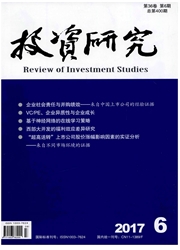

 中文摘要:
中文摘要:
中国赴美上市公司频遭集体诉讼的现象受到广泛关注的同时,证券集体诉讼制度的两面性再次引起我国金融系统和立法机构的讨论。本文通过对2000至2012年中国赴美上市公司样本实证研究后发现,中国赴美上市公司被频繁集体诉讼并非因为其比非中国公司有更差的公司基本特征,,而是因为它们的"中国标签"。研究结果表明,在行使保护投资者权益的同时,集体诉讼制度为滋生无根据的诉讼提供了温床,为一些良好的中国公司带来不必要的诉讼和大幅的股价波动。本文实证结果也为我国引进集体诉讼制度提供了实证参考,丰富了以中国公司海外上市问题为研究对象的文献。
 英文摘要:
英文摘要:
U.S. listed Chinese firms receive growing scrutiny and so does the class action law. This paper Studies the sample of Chinese firms listed in U.S market from year 2000 to 2012 and finds that the law firms sued Chinese firms not because it has high litigation risk but its Chinese label. The results also indicate that class action may render firms vulnerable to frivolous lawsuits thus largely decrease firms’ market value. This paper contributes to extend a bunch of studies that focus on overseas listing and sheds some light on introducing class action system in China.
 同期刊论文项目
同期刊论文项目
 同项目期刊论文
同项目期刊论文
 期刊信息
期刊信息
